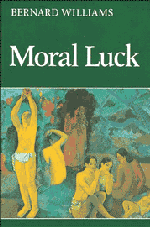Book contents
- Frontmatter
- Contents
- Preface
- Acknowledgements
- 1 Persons, character and morality
- 2 Moral luck
- 3 Utilitarianism and moral self-indulgence
- 4 Politics and moral character
- 5 Conflicts of values
- 6 Justice as a virtue
- 7 Rawls and Pascal's wager
- 8 Internal and external reasons
- 9 Ought and moral obligation
- 10 Practical necessity
- 11 The truth in relativism
- 12 Wittgenstein and idealism
- 13 Another time, another place, another person
7 - Rawls and Pascal's wager
Published online by Cambridge University Press: 05 June 2012
- Frontmatter
- Contents
- Preface
- Acknowledgements
- 1 Persons, character and morality
- 2 Moral luck
- 3 Utilitarianism and moral self-indulgence
- 4 Politics and moral character
- 5 Conflicts of values
- 6 Justice as a virtue
- 7 Rawls and Pascal's wager
- 8 Internal and external reasons
- 9 Ought and moral obligation
- 10 Practical necessity
- 11 The truth in relativism
- 12 Wittgenstein and idealism
- 13 Another time, another place, another person
Summary
Rawls' argument for his two principles of justice, based as it is on an analogy to a rational decision under uncertainty, bears a notable resemblance to another argument designed to lead to momentous moral consequences under conditions of uncertainty, namely Pascal's famous Wager argument to the effect that, it being uncertain whether God exists or not, it must be a rational strategy to behave as if he did. I want to explore the resemblances between the two arguments. My conclusion will be that Rawls' argument shares some faults with Pascal's, but that in addition its premisses are even less enticing than Pascal's. Comparing the two arguments encourages the conclusion, I think, that the decision-theoretic element in Rawls' theory is not convincing.
The argument is, famously, an enormous elaboration and sophistication of the intuitively very appealing idea that a system or set of rules will be a fair one with respect to certain parties if they could all agree on it in advance of knowing what special position in the system, or relation to the rules, they might turn out to have. The intent of the theory (or rather, of this initial part of it: much else happens in Rawls' theory besides) is, on the lines of this idea, to represent moral considerations used by real people under conditions of knowledge in the form of self-interested considerations which would appeal to hypothetical (and entirely notional) people choosing a social system and sets of rules under conditions of very extensive, but not total, ignorance.
- Type
- Chapter
- Information
- Moral LuckPhilosophical Papers 1973–1980, pp. 94 - 100Publisher: Cambridge University PressPrint publication year: 1981
- 3
- Cited by



